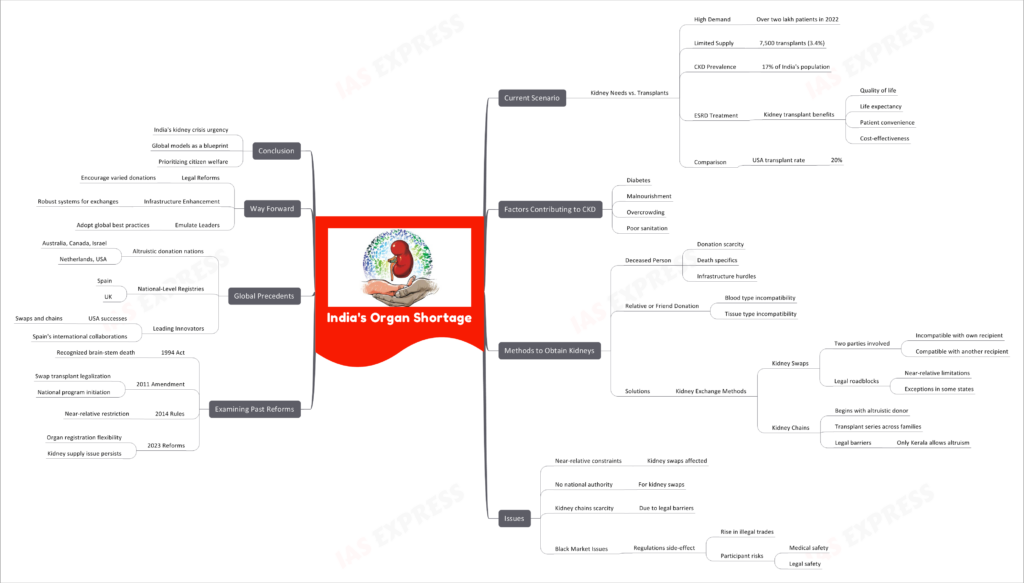India’s Organ Shortage- Reasons, Methods & Global Precedents
India is facing an acute shortage of organs, with a dire need for kidney transplants. In 2022, a staggering number of patients were in need, but only a meager percentage received transplants. The rising prevalence of Chronic Kidney Disease (CKD) in the country has accentuated the urgency of this issue. Developed nations are achieving much higher transplant rates, underscoring the pressing need for change in India’s organ transplant framework.

The Current Scenario
Kidney Needs vs. Transplants
- High Demand: Over two lakh patients needed a kidney transplant in 2022.
- Limited Supply: Only about 7,500 transplants (approximately 3.4%) were conducted.
- Chronic Kidney Disease (CKD): Affects around 17% of India’s population.
- Best Treatment for ESRD: A kidney transplant is preferable in terms of quality of life, life expectancy, patient convenience, and cost-effectiveness.
- Comparison with Developed Nations: Countries like the USA carry out about 20% transplants, significantly higher than India.
Factors Contributing to CKD
- Prevalence of diabetes
- Malnourishment
- Overcrowding
- Poor sanitation
Methods to Obtain Kidneys
- Deceased Person: Limitations include lack of donations, specific death conditions, and infrastructure challenges.
- Relative or Friend Donation: Often, there’s an incompatibility in terms of blood and tissue type.
The Case for Changes
Kidney Exchange Methods
- Kidney Swaps:
- Involves two parties where donors are incompatible with their recipients, but compatible with the other party’s recipient.
- Current roadblocks include legal restrictions which permit only near-relatives to be part of the swap, barring exceptions in certain states.
- Kidney Chains:
- Starts with an altruistic donor, followed by a series of transplants across different families.
- Legal restrictions in India limit the feasibility of these chains. Altruistic kidney donations are illegal in all states except Kerala.
Issues with Current Regulations
- Limited to near-relatives for kidney swaps.
- No national coordinating authority for kidney swaps.
- Lack of kidney chains due to legal restrictions.
Black Market Issues
- Strict regulations lead to a rise in illegal kidney trades, endangering participants due to the absence of proper medical and legal safeguards.
At a Slow Pace: Examining Past Reforms
- Transplantation of Human Organs and Tissues Act 1994: Recognised brain-stem death transplants.
- 2011 Amendment: Legalized swap transplants and initiated a national organ transplant program.
- 2014 Rules: Restricted swap transplants only to near relatives.
- Recent Reforms (2023): Increased flexibility in organ registration but didn’t adequately address the kidney supply issue.
Global Precedents: Learning from Others
- Countries Embracing Change: Australia, Canada, Israel, the Netherlands, and the USA allow altruistic donations.
- National-Level Registries: Spain and the UK have national registries for kidney chains and swaps.
- Leading the Way: The USA has facilitated numerous swaps and chains, while Spain collaborates internationally for kidney exchange.
Way Forward
- Reform Existing Laws: Encourage altruistic donations and non-near relative donations for swaps.
- Enhance Infrastructure: Develop a robust infrastructure for kidney exchanges.
- Emulate Successful Models: Adopt and adapt strategies and regulations from countries with successful kidney transplant frameworks.
Conclusion
The kidney crisis in India is a pressing issue that demands immediate attention and action. While the nation grapples with the rising need for transplants, it is imperative to look towards global best practices, innovate organ transplant policies, and prioritize the welfare of its citizens.
Practice Question for Mains
Comment on the factors contributing to India’s organ shortage. Suggest solutions. (250 words)
If you like this post, please share your feedback in the comments section below so that we will upload more posts like this.

